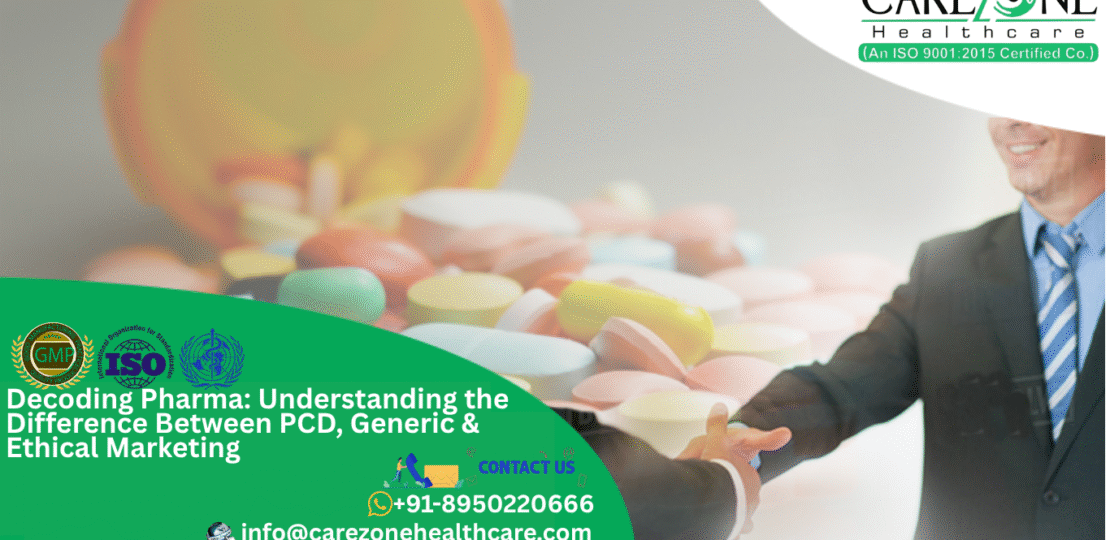June 12, 2025 | by Carezone Healthcare

The pharmaceutical world can feel like a maze to someone new. If you’ve ever heard terms like PCD, generic, or ethical pharma and felt a little lost — you’re not alone.
These three terms — PCD (Propaganda Cum Distribution), Generic, and Ethical pharma — refer to different business models or sectors within the Indian pharmaceutical industry. They’re not just buzzwords; they define how medicines are made, marketed, and sold. And for those planning to enter the pharma business or simply trying to understand where your medicines are coming from, it’s essential to grasp these differences.
In this blog, we’ll break down each one in a simple, relatable way. Whether you’re a budding entrepreneur, a medical rep, or just a curious patient — you’ll walk away with clarity.
Before we dig into definitions, let’s understand why this matters.Think of the pharmaceutical industry as a huge, complex delivery system — like a web that connects companies, doctors, distributors, retailers, and patients. Each sector — PCD, generic, or ethical — follows different rules in terms of how medicines reach patients.
The model a company follows affects:
For entrepreneurs, choosing the right model can determine business success. For patients, it can influence what kind of medicines you’re offered — and at what cost.
PCD stands for Propaganda Cum Distribution. It’s a unique Indian term, and it describes a franchise-based model where a pharma company gives distribution and marketing rights to individuals or small businesses.
Imagine you’re an aspiring entrepreneur in a small town. You don’t own a pharmaceutical factory, but you want to start a pharma business. You contact a company like Carezone Healthcare, and they give you the rights to sell their products in your area. You get monopoly rights, samples, marketing material, and support — while the company handles manufacturing.
Generic pharma refers to medicines that are bioequivalent to branded drugs but are sold under their chemical names — not under a brand label.
So instead of “Augmentin” (brand), you get “Amoxicillin + Clavulanic Acid” (generic).
They’re just as effective, but far more affordable because they skip the expensive branding and advertising.
This is the traditional model of pharmaceutical marketing. Companies promote branded medicines directly to doctors through medical representatives (MRs). Doctors then prescribe those brands to patients.
It’s called “ethical” because it’s based on formal, doctor-approved channels — though the term is somewhat ironic given the marketing tactics used in some cases.
| Feature | PCD Pharma | Generic Pharma | Ethical Pharma |
| Business Type | Franchise-based | Molecule-based | Doctor-driven |
| Marketing Style | Distributor to chemist | Bulk supply | MR to doctor |
| Target Audience | Retailers, chemists | Government & private pharmacies | Doctors |
| Cost to Patient | Medium | Low | High |
| Entry Barrier | Low | Medium | High |
| Control on Sales | Distributor | Pharmacist | Doctor |
| Trust Factor | Moderate | Low to Moderate | High |
Carezone Healthcare is one of the few companies offering solutions across all three models:
This flexible model lets distributors choose what works best for them — or even combine models to scale faster.
As India grows, all three sectors are expected to evolve:
A hybrid model is emerging where distributors handle PCD and generic business together while companies maintain a smaller ethical force for key doctors
Conclusion:
The pharmaceutical industry isn’t one-size-fits-all. It’s a dynamic space made up of distinct yet interconnected models — PCD, Generic, and Ethical pharma — each with its own rhythm, rules, and rewards.
If you’re just starting out, the PCD model offers a low-risk, high-flexibility path where you can be your own boss and grow at your own pace. If you believe in healthcare as a basic right and want to contribute to accessible medicines, the generic sector aligns with your values and is gaining momentum with government support. And if you’re someone who thrives in structured, high-impact environments and wants to work closely with doctors, the ethical model might be your calling.
Each path is valid. Each model plays a vital role in making sure medicines reach people who need them. The key is to understand your own goals, resources, and market, and then choose the path that best suits your journey.
There’s no right or wrong here — only what’s right for you.
So whether you’re planning to start your own franchise, sell affordable generics in underserved areas, or build an elite brand with doctor endorsements — knowledge is your first medicine.
And remember: the success of any pharma model doesn’t lie in the label — PCD, generic, or ethical — but in how honestly, consistently, and compassionately you operate within it.
View all